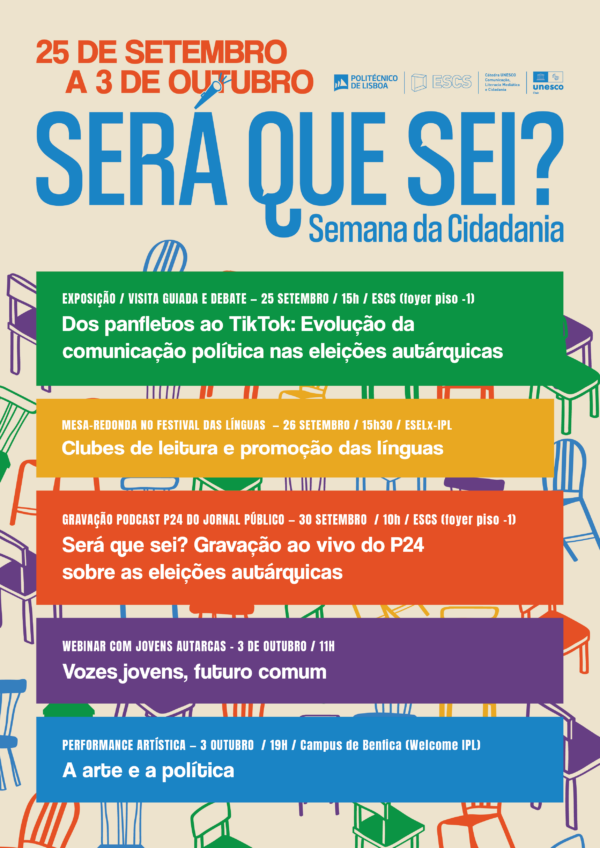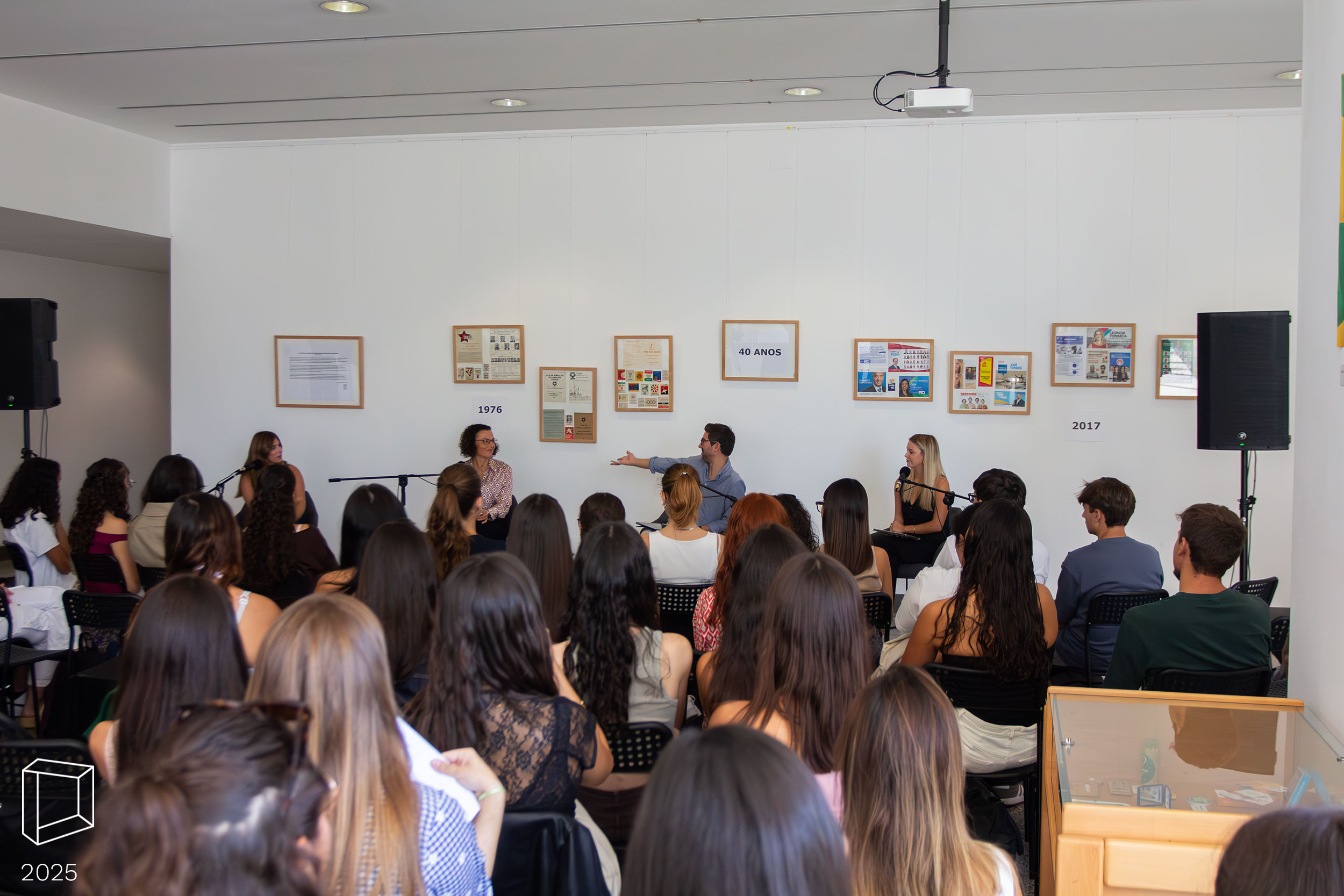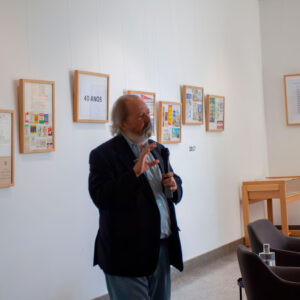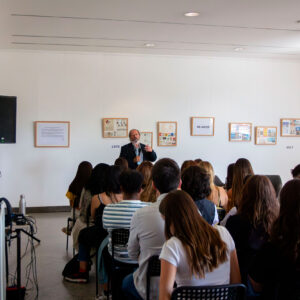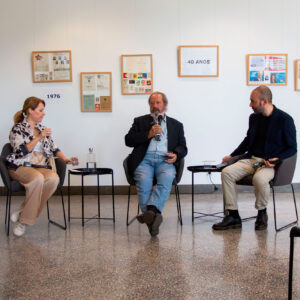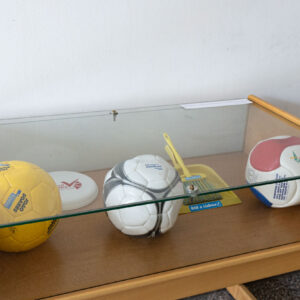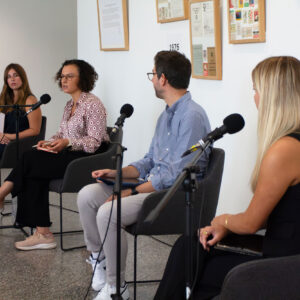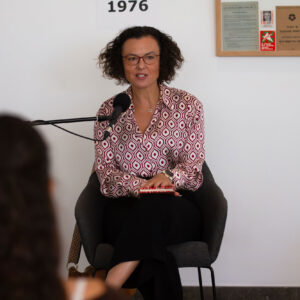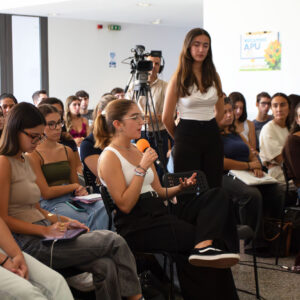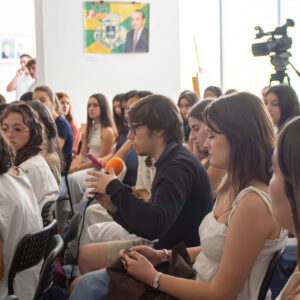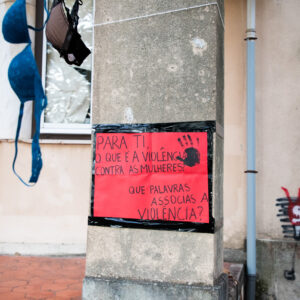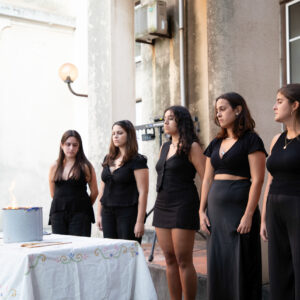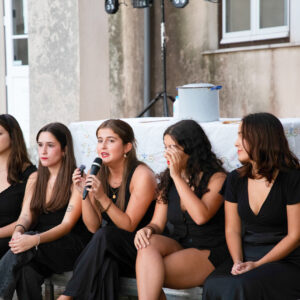More than 300 people took part in the Citizenship Week: An initiative “vital for us to become more aware citizens”
Between September 25 and October 3, the Citizenship Week “Do I Know?” (“Será que Sei?”) — organized by the team of the UNESCO Chair on Communication, Media and Information Literacy and Citizenship (ESCS-IPL) — brought together more than 300 participants, most of them students from the School of Communication and Media Studies (ESCS).
The challenge was to create moments of conversation and reflection that were both thought-provoking and informative, and that encouraged the participation of the IPL community.
The goal? To encourage participants to reflect on their everyday civic engagement and on the issues that affect them most — and what they do about them. Given the proximity of the local elections on October 12, there was also an aim to create spaces where students could clarify their questions about the electoral process.
The program for the Citizenship Week included an exhibition and a debate on the evolution of political communication, a live recording of a podcast dedicated to the local elections, a roundtable on book clubs, a webinar with young election candidates, and an artistic performance.
The positive outcome of this initiative can be summed up by the words of one of the participants: “Programs like these are vital for us to become more aware citizens” and “for complementing our academic education.”
The videos of each activity will soon be available on the website of the UNESCO Chair on Communication, Media and Information Literacy and Citizenship.
The “commercialization” of political communication in local election campaigns
On day 1, the foyer on floor -1 of ESCS-IPL proved too small to accommodate everyone who wanted to attend the debate “From leaflets to TikTok: The evolution of political communication in local elections,” featuring historian José Pacheco Pereira and Political Communication professor Rita Figueiras, and moderated by Nuno da Silva Jorge, a faculty member at ESCS-IPL.
Before the discussion began, Pacheco Pereira gave a brief presentation of the political communication materials at the venue — an exhibition organized by Citizenship Week using resources from the Arquivo Ephemera.
Between 1976 and 2017, the period covered by the exhibition, political communication changed significantly. “There is greater professionalization of campaigns,” noted Pacheco Pereira, adding that “the problem is that sometimes there are posters that look more like those of Remax.”
Rita Figueiras, agreeing with the idea that there is a standardization and “commercialization of the political message,” explained that this phenomenon has brought propaganda “closer to a commercial discourse,” characterized by being “more appealing and more simplistic.”
Regarding the impact of social media, particularly TikTok, on the way politicians communicate today, Rita Figueiras believes that “there is a pace that has accelerated, because technologies have also sped up the entire process of producing discourse.” Students attending the debate questioned whether adapting to these platforms ends up compromising the content being shared. According to the researcher, this is indeed a consequence: “We have increasingly shorter speeches, more assertive or even more aggressive discourse dynamics, because it’s faster, easier, and it generates more engagement.”
At the end of the debate, the enthusiasm generated by the session was evident among the audience. “I wish there were more sessions like this, both on the same topic and on others,” commented one of the more than 100 students who attended the discussion.
You can read more about the debate in this CNN article.
- José Pacheco Pereira (Gabcom/ESCS)
- (Gabcom/ESCS)
- Rita Figueiras, José Pacheco Pereira, Nuno da Silva Jorge (Gabcom/ESCS)
- Gifts distributed by political parties during local elections campaigns (Gabcom/ESCS)
Book clubs promoting citizenship
On September 26, European Day of Languages, the discussion focused on the role of higher education book clubs in reading habits and language promotion, in a roundtable moderated by Carina Rodrigues and held as part of the Festival of Languages, organized by the Erasmus+ National Agency for Education and Training and the Language and Culture Center (Centro de Línguas e Cultura, CLiC) of IPL.
The guests — Antónia Estrela (LEReduca, Lisbon School of Education, ESELx), Fernanda Bonacho (EntreLinhas, ESCS), and Sara Leite (reading club of the Higher Institute of Education and Sciences, ISEC) — shared stories that illustrate the humanizing and stimulating role of the meetings organized by their book clubs.
Sara Leite recalled that the ISEC Reading Club was created to bring people together during the pandemic and has continued because it made sense for the academic community. Antónia Estrela, commenting on LEReduca’s role in language development, emphasized that this book club has enabled participants to diversify the books they read and expand their vocabulary. Fernanda Bonacho, in turn, highlighted the community-oriented and media and civic education aspects of EntreLinhas, recalling a session in which participants discussed combating hate speech through the books they brought, in a session attended by participants aged 10 to 83.
Although the guests acknowledged that it is difficult to ensure student participation in the sessions, they all agreed that “it is always worth organizing them, even if each session only reaches one or two more people,” in the words of Antónia Estrela.
Inspired by the meeting, Sara Leite and Fernanda Bonacho also expressed their desire to further open their book clubs to different voices and cultures, including greater involvement of international students, who are studying in Portugal via exchange programs such as Erasmus+.
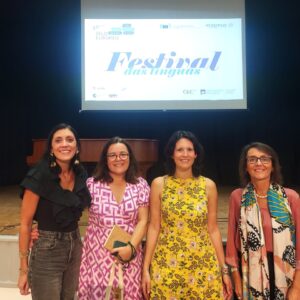
Carina Rodrigues, Fernanda Bonacho, Antónia Estrela and Sara Leite
Questions and answers on the local elections: An “interesting and fun” experience
On September 30, the ESCS foyer was once again packed, this time for the live recording of the P24 podcast from the newspaper Público, featuring questions about the local elections asked by students across the various ESCS degrees.
More than 70 students attended the conversation between Carla Luís, coordinator of VoteDHr – Eleições, Democracia e Direitos Humanos (Elections, Democracy and Human Rights); Ruben Martins, journalist at Público; and the Journalism students Maria Inês Rocha and Margarida Velez Dias from ESCS FM.
The questions discussed during the session were suggested by ESCS students, who had been invited to submit their queries about the local election process. Nearly 200 contributions were received by the organizers.
“Which governing bodies do we elect in these elections?”, “What are the different roles of the city council and the city parliament?”, and “In local elections, braille ballots are not provided. What alternatives exist for blind voters who wish to vote?” were some of the questions posed by the students.
The outcome can be heard in the October 1 episode of P24, available on the Público website.
“The podcast recording was a very informative moment that clarified doubts I had about the local elections,” commented one student, describing the experience as “interesting and fun.”
- Margarida Velez Dias, Carla Luís, Ruben Martins, Maria Inês Rocha (Gabcom/ESCS)
- Carla Luís (Gabcom/ESCS)
- Students ask questions during the session (Gabcom/ESCS)
- Students ask questions during the session (Gabcom/ESCS)
Sub-25 local election candidates: A lesson in democracy
On the final day of the Citizenship Week, a webinar with seven young candidates for the local elections surprised the 60 students (approx.) who attended the online session in their classroom.
The surprise was due to the speakers’ ages, ranging from 18 to 25, and their high level of political engagement.
The webinar featured Amélia Saraiva (19, CDU, Lisbon), António Soares (23, BE, Santo Tirso), Bernardo Ferronha (25, IL, Algés/Oeiras), Diana Bravo (23, PSD, Guifões/Matosinhos), Helena Melo de Castro (18, PS, Monção), Joana Oliveira Costa (23, CDS-PP, Lisbon), and Pedro Pinheiro (23, Livre, Matosinhos). All parties with parliamentary representation were invited.
Coming from different regions of the country and representing seven political parties, the candidates shared a common desire to play an active role in their communities. They feel they can make the most difference in local elections because the issues are very tangible and directly affect their daily lives — from transportation to get to university or work, the condition of the streets they use, the cost of renting housing, to the diversity of cultural offerings.
In a cordial and relaxed atmosphere, the candidates shared their stories of how they became involved in politics, valuing above all the democratic freedom that these experiences represent. For example, one of the candidates mentioned growing up in a highly politicized family, where she learned the importance of taking an active political role. Interestingly, she later joined a party whose ideas differ significantly from those of her family background.
At the end of the session, the candidates expressed their hope that voter turnout rate will increase and that, regardless of the election results, collaboration among all elected representatives will be possible for the good of their communities.
.
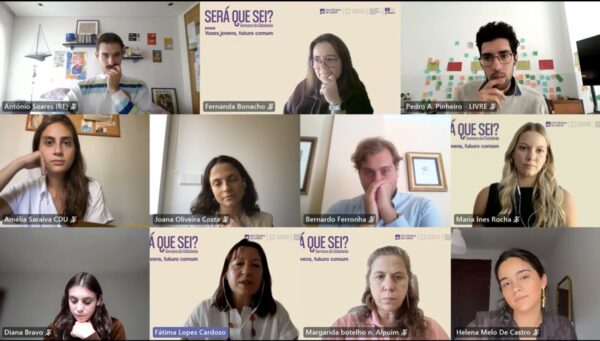
When art and politics come together
The Citizenship Week concluded on the afternoon of October 3 with an artistic performance on the Panamá Stage of the Welcome IPL event, held on the Benfica Campus.
In a presentation titled “(Des)Amparo,” five students from the Master’s programs in Teacher Training at the Lisbon School of Education (ESELx) invited the audience to reflect on violence against women.
The performance’s setting evoked a domestic environment: a table with a pot, and a clothesline with several bras hanging — attached to the bras were papers with words written by the audience on the topic. Throughout the presentation, only a recording of excerpts from interviews with women of various ages could be heard, recounting real experiences of violence in their lives. The students, in silence, interacted with all these elements, using symbolic gestures of liberation.
The serious — in some cases, moved — expressions of the more than 70 attendees, and the silence that prevailed throughout the performance, reflected the ongoing need to raise awareness of this issue.
At the end, the students explained the process behind the creation of their artistic piece, the result of a project for the Arts and Physical Education course, coordinated by professors Abel Arez and Natália Vieira.
- (GCI/IPL)
- (GCI/IPL)
- (GCI/IPL)
- (GCI/IPL)
The Citizenship Week “Do I Know?” concluded with messages calling for respect and dignity, demonstrating how civic engagement can also be expressed through art.
Looking ahead, there is motivation to hold more editions of the Citizenship Week, and a desire to respond to the students’ request for “even more opportunities for participation.”
